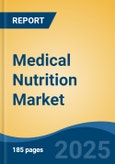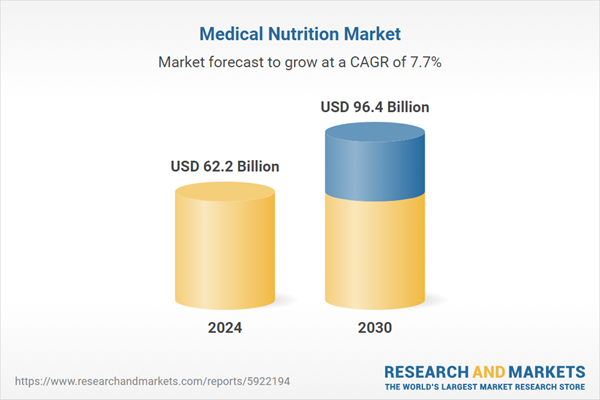Speak directly to the analyst to clarify any post sales queries you may have.
10% Free customizationThis report comes with 10% free customization, enabling you to add data that meets your specific business needs.
The South Asia sub-region bears a significant burden of malnutrition among children under 5 years old. Also, the UN reports that Asia’s undernourished population rose from 361.3 million in 2019 to 418.0 million in 2020, with the prevalence of undernourishment increasing from 7.9% to 9.0%. Medical nutrition refers to the specialized use of nutrients, tailored diets, and therapeutic food formulations to manage specific health conditions, support recovery, and improve overall well-being.
It is an essential component of healthcare, targeting conditions such as malnutrition, chronic illnesses, metabolic disorders, and recovery from surgeries or injuries. Medical nutrition includes oral supplements, enteral feeding (tube feeding), and parenteral nutrition (intravenous feeding) when regular diets are insufficient. Designed under medical supervision, it addresses individual nutritional deficiencies, optimizes health outcomes, and prevents complications. Medical nutrition plays a pivotal role in enhancing the quality of life for patients across various medical conditions.
Key Market Drivers
Rising Health Awareness
In recent years, a notable shift has occurred in how people perceive health and wellness. There is an increasing awareness of the profound connection between nutrition and well-being, which has significantly contributed to the growth of the global medical nutrition market. This heightened health consciousness is driving individuals to seek specialized nutrition solutions, making the medical nutrition market a dynamic and rapidly expanding industry. For instance, The World Health Organization (WHO) reports that the global population aged 60 and over is projected to grow substantially, increasing from approximately 1 billion in 2020 to about 1.4 billion by 2030. Furthermore, it is expected to nearly double by 2050, reaching around 2.1 billion.Rising health awareness has prompted a paradigm shift from reactive healthcare to proactive health management. Individuals are increasingly taking charge of their well-being by adopting healthier lifestyles and actively seeking ways to prevent health issues. Medical nutrition plays a crucial role in this shift, offering a means to prevent and manage health conditions through tailored dietary interventions.
Key Market Challenges
Stringent Quality Assurance
Quality assurance is paramount in the medical nutrition market. Ensuring the safety and efficacy of these products is a complex process, with strict standards set by regulatory agencies such as the U.S. Food and Drug Administration (FDA) and the European Food Safety Authority (EFSA). Adherence to these standards is essential to maintain consumer trust, which can be a challenge for smaller manufacturers and new entrants in the market.Key Market Trends
Personalized Nutrition
Personalization is a dominant trend across the food and nutrition industry, and medical nutrition is no exception. The future of medical nutrition is increasingly individualized, with tailored solutions that account for a person's unique health status, dietary preferences, and genetics. This trend is enabled by the growing understanding of nutrigenomics, which explores how an individual's genes interact with their diet, allowing for precision nutrition recommendations.Key Market Players
- Abbott Nutrition Ltd
- Nestle Health Science SA
- Baxter Healthcare Corp
- B Braun SE
- Danone SA
- Perrigo Co PLC
- Fresenius Kabi AG
- AYMES Nutrition
- Reckitt Benckiser Group PLC
- Ajinomoto Cambrooke Inc.
Report Scope:
In this report, the Global Medical Nutrition Market has been segmented into the following categories, in addition to the industry trends which have also been detailed below:Medical Nutrition Market, By Route of Administration:
- Oral and Enteral
- Parenteral
Medical Nutrition Market, By Application:
- Malnutrition
- Metabolic Disorders
- Gastrointestinal Diseases
- Cancer
- Neurological Diseases
- Others
Medical Nutrition Market, By End User:
- Pediatric
- Adult
Medical Nutrition Market, By Region:
- North America
- United States
- Canada
- Mexico
- Europe
- Germany
- United Kingdom
- France
- Italy
- Spain
- Asia-Pacific
- China
- Japan
- India
- Australia
- South Korea
- South America
- Brazil
- Argentina
- Colombia
- Middle East & Africa
- South Africa
- Saudi Arabia
- UAE
- Kuwait
Competitive Landscape
Company Profiles: Detailed analysis of the major companies present in the Global Medical Nutrition Market.Available Customizations:
With the given market data, the publisher offers customizations according to a company's specific needs. The following customization options are available for the report.Company Information
- Detailed analysis and profiling of additional market players (up to five).
This product will be delivered within 1-3 business days.
Table of Contents
Companies Mentioned
- Abbott Nutrition Ltd
- Nestle Health Science SA
- Baxter Healthcare Corp
- B Braun SE
- Danone SA
- Perrigo Co PLC
- Fresenius Kabi AG
- AYMES Nutrition
- Reckitt Benckiser Group PLC
- Ajinomoto Cambrooke Inc.
Table Information
| Report Attribute | Details |
|---|---|
| No. of Pages | 185 |
| Published | March 2025 |
| Forecast Period | 2024 - 2030 |
| Estimated Market Value ( USD | $ 62.2 Billion |
| Forecasted Market Value ( USD | $ 96.4 Billion |
| Compound Annual Growth Rate | 7.7% |
| Regions Covered | Global |
| No. of Companies Mentioned | 10 |









